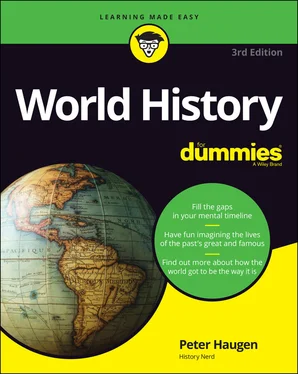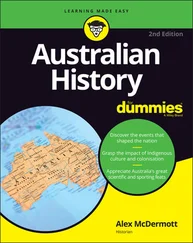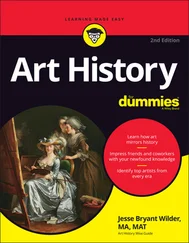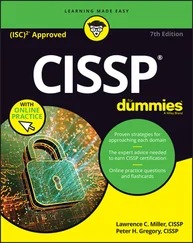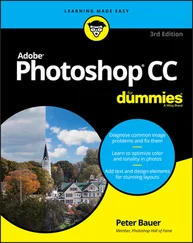An elite class of priests and nobles ruled the majority, who tended fields cleared from the jungle. Modern experts haven’t settled on why the Maya ultimately abandoned their cities, although environmental decline seems to have been a factor.
Farther south, a culture called the Paracas took root as early as 750 BC on a peninsula jutting from the southern coast of Peru. What’s known of the Paracas comes purely from archaeological evidence. Apparently at its height, from the first century BC until as late as the fourth century AD, this farming civilization built extensive canals for irrigation.
The Paracas were skilled at weaving, a fact illustrated by the beautifully embroidered textiles found wrapped around the mummified bodies of their dead. Archaeologists refer to a large seaside complex of Paracas tombs as the Paracas Necropolis, meaning city of the dead.
In the dry river valleys inland from the south coast of Peru, the Nazca culture appears to have risen around 200 BC, perhaps as an offshoot of the Paracas. As with the Paracas, most of what’s known of the Nazca comes through interpretation of surviving artifacts such as textiles and colorful pottery.
Based on such evidence, archaeologists think the Nazca reached their civilization’s height between 200 BC and 500 AD. Their huge-scale earthen etchings, designs that are most visible today from the air, are cited today as evidence of long-ago interplanetary visitors. Theorists say that the figures can’t be seen except from the air, so they could have been landing strips for alien spaceships. Archaeologists who study the Nazca, however, point out that the figures can indeed be seen from surrounding hills and that the lines of the drawings are far more likely to have been ritual paths that were part of the Nazca religion.
Arising a little later than the Nazca — in the first century AD — in the fertile valleys inland from the north coast of Peru, the Moche culture may have resembled that of Classical Greece, in that it seems to have consisted of politically independent city-states united by a common language and religion.
Although the Maya had hieroglyphics, the Paracas, Nazca, and Moche people left no evidence of written language.
Remembering Far-Flung Cultures
Over the long stretch of time when the Roman Empire was rising and falling, other cultures around the globe continued to grow and change, too, many beyond the main focus of this chapter, but still important. Just because certain cultures seem so influential to the course of history, you don’t have to forget about how many, varied ways that human societies developed and progressed. For example,
The Aksum: In northeast Africa, where Ethiopia is now, the Aksum people put together an empire that grew rich after 200 AD by trading with places as far away as India. The Aksum became Christian in the fourth century AD and spread the new religion to neighboring peoples.
The Celts: Tribal people with sophisticated metalworking skills but no written language, the Celts kept expanding their European territory from central Europe toward the west and south. By the fifth century BC, they were dominant in Gaul (modern France), England, Ireland, much of Scotland, and parts of Spain. By the third century BC, the Celts spread through the Balkans. They made beautiful golden jewelry and harness ornaments. In some places, the Celts built large forts atop hills and fought Roman legions as the empire absorbed Europe. Later, the Celts clashed with Romans and other invaders who overran their territory through the early centuries AD.
The Japanese: Discovering how to mine and smelt iron, the Japanese joined the Iron Age sometime in the third century AD. They buried emperors and other big shots with their weapons and other valuable possessions in mounds made of stone and earth.
753 BC:According to legend, Romulus, the half-mortal son of a Greek-Roman war god, builds the city of Rome.
About 645 BC:According to historians, people from a group of small settlements in west-central Italy establish the city of Rome on a hilly site along the Tiber River.
509 BC:Romans rise up against King Tarquinius Superbus and drive him into exile. They establish a republic in place of the monarchy.
238 BC:Asoka, emperor of India, dies. His Mauryan Dynasty begins to decline.
221 BC:The First Emperor of Qin unites warring Chinese states.
140 BC:Mithradates I begins a campaign conquest to enlarge the Parthian Empire.
45 BC:Julius Caesar emerges victorious from Roman civil war and takes the title Dictator for Life.
27 BC:Octavian, great-nephew of the assassinated Julius Caesar, accepts the title Augustus, becoming Rome’s first emperor.
330 AD:Roman Emperor Constantine completed building his new capital city, Constantinople, in Turkey, far to the east of Rome.
476 AD:Barbarian invaders remove Romulus Augustus, the last Roman emperor of the West, from his throne.
Конец ознакомительного фрагмента.
Текст предоставлен ООО «ЛитРес».
Прочитайте эту книгу целиком, купив полную легальную версию на ЛитРес.
Безопасно оплатить книгу можно банковской картой Visa, MasterCard, Maestro, со счета мобильного телефона, с платежного терминала, в салоне МТС или Связной, через PayPal, WebMoney, Яндекс.Деньги, QIWI Кошелек, бонусными картами или другим удобным Вам способом.
